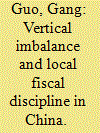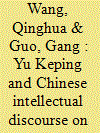| Srl | Item |
| 1 |
ID:
082031


|
|
|
|
|
| Publication |
2008.
|
| Summary/Abstract |
This article examines local fiscal behavior in contemporary China against the backdrop of decentralized spending responsibilities and recentralized revenues. Vertical imbalance after the 1994 tax-sharing system reform, coupled with other features of the fiscal institutions, is not conducive to conservative local fiscal behavior. Moreover, a main driving force behind the expansion of local governments is the politically motivated intergovernmental transfer scheme. The center in effect "buys" political stability in sensitive areas while holding local leaders accountable for their tax efforts. A dynamic panel analysis of Chinese counties reveals that a million-yuan increase in general transfer payment and salary raise subsidies would add, respectively, fifteen and sixteen employees to the county government payroll, other things being equal. At the same time, increased subsidies from upper-level governments do not "crowd out" or significantly affect local tax effort. Additional dynamic panel data analysis at the provincial level produced similar findings
|
|
|
|
|
|
|
|
|
|
|
|
|
|
|
|
| 2 |
ID:
145745


|
|
|
|
|
| Summary/Abstract |
By reviewing the ideas of Yu Keping, one of the most prominent Chinese theorists on Chinese-style democracy and a key contributor to Chinese intellectual discourse on good governance, this article has two objectives: to fill a research gap in China studies by examining influential discourse during the past decade; and to shed light on Yu's controversial conception of Chinese-style democracy, which is intertwined with his views on good governance. We find that the discourse revolves around the call to “move China towards good governance.” First, the ultimate objective of China's political reform is to move towards good governance, and not towards what Western social scientists call “democracy.” Second, “good government” and civil society are two keys for achieving good governance, which demonstrates that Yu's basic orientation is liberal. Third, governance reform, constituting a major component of China's political reform, has achieved much progress.
|
|
|
|
|
|
|
|
|
|
|
|
|
|
|
|